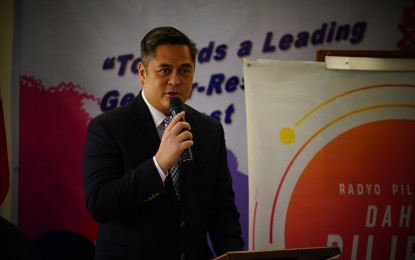
Communications Secretary Martin Andanar
MANILA -- In an effort to stop the spread of the 2019 novel coronavirus (2019-nCoV) in the country, Malacañang is requiring visitors and even government workers to state their travel history and health status, Presidential Communications Operations Office (PCOO) Secretary Martin Andanar said in a statement.
Andanar’s statement came a day after a declaration form issued by the Office of the President’s Events Management Cluster (OP-EMC) was distributed to Palace visitors and even government officials.
“With the public health emergency declaration due to the 2019 novel coronavirus and the additional confirmed case of nCoV in the country, the health declaration form is an additional precautionary measure to ensure the safety and security, not just of President Rodrigo Duterte, but (also of) everyone who is working at or visiting Malacañang,” he said.
“Therefore, security clearances that have been augmented through a health declaration form by the Events Management Cluster of the Office of the President for those who have engagements with the President, are warranted,” the PCOO chief added.
The declaration form requires a person to state his name, sex, age, contact number, e-mail address, and home address in the country.
The person must also identify the foreign countries and Philippine cities he visited in the past 14 days.
The declaration form also asks the person if he has been sick in the past 30 days or has experienced fever, colds, cough, sore throat, or breathing difficulties in the past 14 days.
It also mandates the person to confirm if he has been in close contact with farm animals or exposed to wild animals in the last 14 days.
Guests and employees of Malacañang are told to give “true, correct, and complete information,” warning them that the failure to answer any question or giving any falsified response may have serious consequences based on Articles 171 and 172 of the Revised Penal Code.
Articles 171 and 172 of the Revised Penal Code states that anyone who falsifies documents will face imprisonment of up to 12 years and a fine of up to PHP5,000.
Presidential Security Group commander, Brig. Gen. Jose Eriel Niembra on Thursday said the issuance of declaration forms is one of the precautionary measures against the 2019-nCoV.
Andanar said the declaration form is a precautionary measure that covers not only all visitors, but also the Cabinet Secretaries, government officials, and employees “who will interact with the President.”
“We continue to assure the public that the relevant health and law enforcement agencies are working on containing the spread of the virus,” the PCOO chief said.
“Furthermore, we will continue to notify the public through our Laging Handa Campaign on any developments on the issue of the 2019-nCoV,” he added.
The 2019-nCoV outbreak was first reported in Wuhan, China in December 2019 and later spread to over two dozen countries, prompting the World Health Organization to declare a global emergency.
As of Friday, the global death toll from the coronavirus outbreak climbed to more than 600 and the total infections rose to over 30,000. (PNA)
